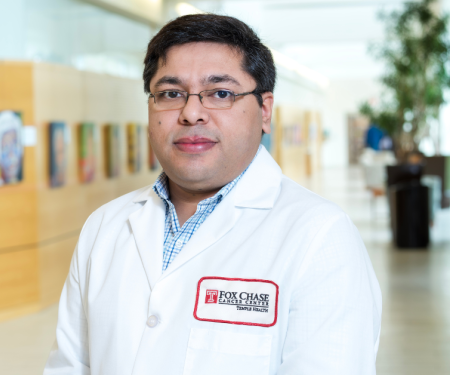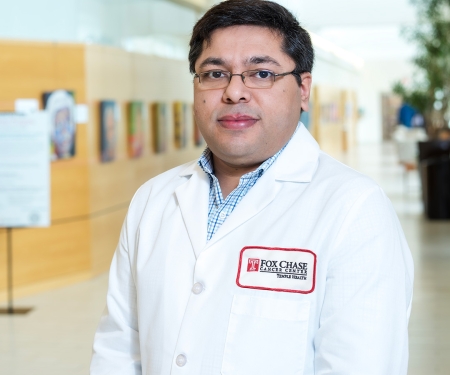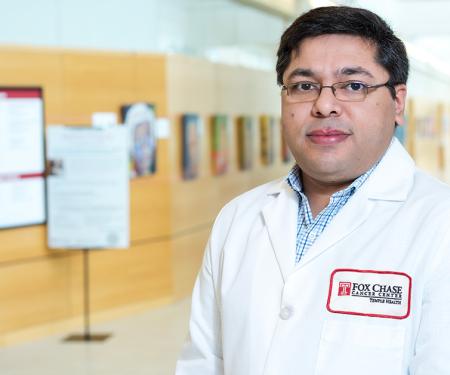Related Articles
00 / 00
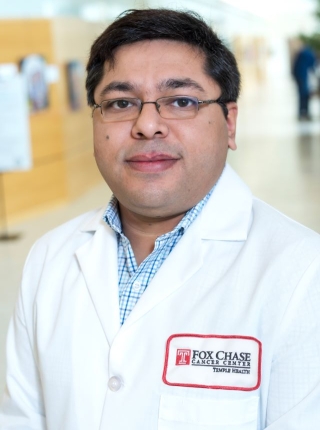
Assistant Professor
My research program to date has contributed to our fundamental understanding of how changes in ‘receptor structure leads to function’. Using specialized quantitative imaging techniques with complementary cell and molecular biology approaches both in vitro and in vivo, I have uncovered novel ways by which the cytokine receptor, Growth Hormone Receptor (GHR), regulates several biological functions in normal physiology and cellular dysfunction. GHR is expressed in every physiological system of the body and any aberrant signaling owing to internal factors (genetic) or external factors (environment) or both can result in cellular dysfunction. I deciphered the mechanism of the first single nucleotide polymorphism of GHR associated with increased susceptibility to lung cancer. Concurrently, my work described the mechanism of anti-insulin effects of Growth Hormone, a phenomenon that has remained elusive for 50 years. Using innovative mouse models with delineated GHR signaling I showed impaired gluconeogenesis and glucose metabolism via GH-mediated JAK2/STAT5 action. A critical attribute of calorie restriction or intermittent fasting is reduction of GH and improvement of insulin sensitivity which is where my research fills the gap. Subsequent to my PhD in GHR biology, my postdoctoral research has shed light on the effect of single nucleotide polymorphisms in pigmentation genes (IRF4, MTAP and PLA2G6) on melanocytic biology as well as the role of MITF and BRN2 transcription factors in ‘melanoma phenotype switching’ and role of orphan nuclear receptor NR4As in DNA repair.
In the Weeraratna Laboratory, I undertook how sex as well as the age of the host microenvironment guides metastasis, dormancy, and therapy resistance in melanoma. Using a unique resource of normal skin fibroblasts from healthy donors stratified by age across both the sexes and utilizing animal models, my research program aims to determine the metabolic, biophysical, and biochemical changes that affect the communication between tumor, stromal and immune cells thereby regulating metastasis and therapeutic responses. The implications of these data will ultimately result in change in the current clinical practice. My long-term research goal as an independent investigator is in precision oncology by taking a holistic approach and incorporating gender medicine and geroscience.
2021 – Current: Oz Metastasis Research Society
2021 – Current: American Association for Cancer Research
2021 – Current: European Association for Cancer Research
2019 - Current: Society for Melanoma Research
2018 – Current: Growth Hormone Research Society (Invited)
2017 – 2020: Endocrine Society of Australia
2014 – 2015: The Endocrine Society

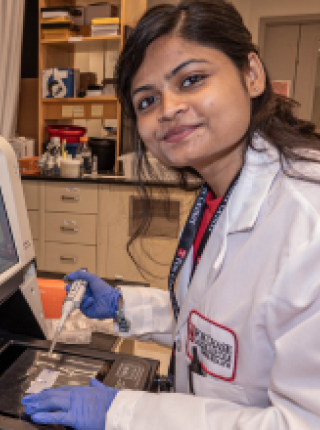
Julia Lamperelli
Scientist Technician I
Brandy Nguyen
Temple Undergraduate Student
Ellie Moppe
Empower Fellow 2025
Sai Skavya Sanicar
LSKOM Medical Student
Yash Chhabra* # , Pernille Seiffert*, Rachel Gormal*, Manon Vullings, Christine Lee, Tristan Wallis, Farhad Dehkhoda, Sowmya Sowmya, Nina Jacobsen, Kresten Lindorff-Larsen, Nela Durisic, Michael Waters, Frederic Meunier# , Birthe Kragelund# , and Andrew Brooks# . Tyrosine kinases compete for growth hormone receptor binding and regulate receptor mobility and degradation. Cell Reports 2023 May 9;42(5):112490. doi: 10.1016/j.celrep.2023.112490. *Shared First and #Co-corresponding author.
Yash Chhabra*, Ashani T. Weeraratna*. Fibroblasts in cancer: Unity in heterogeneity. Cell 2023 Apr 13;186(8):1580- 1609. doi: 10.1016/j.cell.2023.03.016. *joint co-corresponding.
Fane ME, Chhabra Y, Alicea GM, Maranto DA, Douglass SM, Webster MR, Rebecca VW, Marino GE, Almeida F, Ecker BL, Zabransky DJ, Hüser L, Beer T, Tang HY, Kossenkov A, Herlyn M, Speicher DW, Xu W, Xu X, Jaffee EM, Aguirre-Ghiso JA, Weeraratna AT. Stromal changes in the aged lung induce an emergence from melanoma dormancy. Nature. 2022 Jun;606(7913):396-405. doi: 10.1038/s41586-022-04774-2. Epub 2022 Jun 1.
Fane ME, Chhabra Y, Spoerri L, Simmons JL, Ludwig R, Bonvin E, Goding CR, Sturm RA, Boyle GM, Haass NK, Piper M, Smith AG. Reciprocal Regulation of BRN2 and NOTCH1/2 Signaling Synergistically Drives Melanoma Cell Migration and Invasion. J Invest Dermatol. 2022 Jul;142(7):1845-1857. doi: 10.1016/j.jid.2020.12.039.
Bridgford JL, Lee SM, Lee CMM, Guglielmelli P, Rumi E, Pietra D, Wilcox S, Chhabra Y, Rubin AF, Cazzola M, Vannucchi AM, Brooks AJ, Call ME, Call MJ. Novel drivers and modifiers of MPL-dependent oncogenic transformation identified by deep mutational scanning. Blood 2020 Jan 23;135(4):287-292. doi: 10.1182/blood.2019002561.
Ishikawa M, Brooks AJ, Fernández-Rojo MA, Medina J, Chhabra Y, Minami S, Tunny KA, Parton RG, Vivian JP, Rossjohn J, Chikani V, Ramm GA, Ho KKY, Waters MJ. Growth Hormone Stops Excessive Inflammation After Partial Hepatectomy, Allowing Liver Regeneration and Survival Through Induction of H2-Bl/HLA-G. Hepatology 2021 Feb;73(2):759-775. doi: 10.1002/hep.31297.
Douglass SM, Fane ME, Sanseviero E, Ecker BL, Kugel CH 3rd, Behera R, Kumar V, Tcyganov EN, Yin X, Liu Q, Chhabra Y, Alicea GM, Kuruvilla R, Gabrilovich DI, Weeraratna AT. Myeloid-Derived Suppressor Cells Are a Major Source of Wnt5A in the Melanoma Microenvironment and Depend on Wnt5A for Full Suppressive Activity. Cancer Res. 2021 Feb 1;81(3):658-670. doi: 10.1158/0008-5472.CAN-20-1238.
Chhabra Y, Lee CMM, Müller AF, Brooks AJ. GHR signalling: Receptor activation and degradation mechanisms. Molecular and Cellular Endocrinology 2021 Jan 15;520:111075. doi: 10.1016/j.mce.2020.111075.
Fane ME, Ecker BL, Kaur A, Marino GE, Alicea GM, Douglass SM, Chhabra Y, Webster MR, Marshall A, Colling R, Espinosa O, Coupe N, Maroo N, Campo L, Middleton MR, Corrie P, Xu X, Karakousis GC, Weeraratna AT. sFRP2 Supersedes VEGF as an Age-related Driver of Angiogenesis in Melanoma, Affecting Response to Anti-VEGF Therapy in Older Patients. Clin Cancer Res. 2020 Nov 1;26(21):5709-5719. doi: 10.1158/1078-0432.CCR-20-0446.
Chhabra Y*, Nelson CN, Plescher M, Barclay JL, Smith AG, Andrikopoulos S, Mangiafico S, Waxman DJ, Brooks AJ, Waters MJ*. Loss of Growth Hormone mediated Signal Transducer and Activator of Transcription 5 (STAT5) signalling in mice results in insulin sensitivity with obesity. FASEB Journal 2019 (*joint corresponding author) Feb 19:fj201802328R. doi: 10.1096/fj.201802328R.
Fane ME, Chhabra Y, Smith AG, Sturm RA. BRN2, a POUerful driver of melanoma phenotype switching and metastasis. Pigment Cell & Melanoma ReNelson CN, List EO, Ieremia M, Constantin L, Chhabra Y, Kopchick JJ, Waters MJ. Growth hormone activated STAT5 is required for induction of beige fat in vivo. GH & IGF Research 2018. vol 42, pp. 40-51.search 2018. doi: 10.1111/pcmr.12710.
Nelson CN, List EO, Ieremia M, Constantin L, Chhabra Y, Kopchick JJ, Waters MJ. Growth hormone activated STAT5 is required for induction of beige fat in vivo. GH & IGF Research 2018. vol 42, pp. 40-51.
Chhabra Y, Wong HY, Nikolajsen LF, Steinocher H, Papadopulos A, Tunny K, Meunier FA, Smith AG, Kragelund BB, Brooks AJ, Waters MJ. A Growth Hormone Receptor SNP Promotes Lung Cancer by Impairment of SOCS2-mediated degradation. Oncogene 2018 Jan 25;37(4):489-501. doi: 10.1038/onc.2017.352.
Chhabra Y, Yong HXL, Fane ME, Soogrim A, Lim W, Mahiuddin DN, Kim RSQ, Ashcroft M, Beatson SA, Ainger SA, Smit DJ, Jagirdar K, Walker GJ, Sturm RA, Smith AG. Genetic variation in IRF4 expression modulates growth, tyrosinase expression and interferon-gamma responses in melanocytic cells. Pigment Cell & Melanoma Research 2018 Jan;31(1):51-63. doi: 10.1111/pcmr.12620.
Yin K*, Chhabra Y*, Tropee R, Lim YC, Fane M, Dray E, Sturm RA, Smith AG. NR4A2 Promotes DNA Double-strand BreakRepairUpon Exposure toUVR.MolecularCancerResearch(*joint first author) 2017Sep;15(9):1184-1196. doi: 10.1158/1541-7786.MCR-17-0002.
Fane ME, Chhabra Y, Hollingsworth D,, Simmons JL, Spoerri L, Oh TG, Chauhan J, Chin T, Harris L, Harvey TJ, Muscat G, Goding CR, Sturm RA, Haass NK, Boyle GM, Piper M, Smith AG. NFIB mediates BRN2 driven melanoma cell migration and invasion through regulation of EZH2 and MITF. EBioMedicine 2017 Feb; 16:63-75. doi: 10.1016/j.ebiom.2017.01.013.
Iyer S, Chhabra Y, Harvey TJ, Wang R, Chiu HS, Smith AG, Thomas WG, Pennisi DJ, Piper M. CRIM1 is necessary for coronary vascular endothelial cell development and homeostasis. Journal of Molecular Histology 2016. 48(1):53- 61. doi: 10.1007/s10735-016-9702-3. Impact Factor: 2.362
Waters MJ, Brooks AJ, Chhabra Y. A new mechanism for growth hormone receptor activation of JAK2 and implications for related cytokine receptors. JAK-STAT 2014 16; 3: e29569.doi: 10.4161/jkst.29569. (Invited Review).
Brooks AJ, Dai W, O'Mara ML, Abankwa D, Chhabra Y, Pelekanos RA, Gardon O, Tunny KA, Blucher KM, Morton CJ, Parker MW, Sierecki E, Gambin Y, Gomez GA, Alexandrov K, Wilson IA, Doxastakis M, Mark AE, Waters MJ. Mechanism of activation of protein kinase JAK2 by the growth hormone receptor. Science 2014 16; 344(6185): 1249783. doi: 10.1126/science.1249783.
Gupta C, Chapekar T, Chhabra Y, Singh P, Sinha S, Luthra K. Differential response to sustained stimulation by hCG &LH on goat ovarian granulosa cells. Indian Journal of Medical Research 2012, vol. 135, no. 3, pp. 331-340
Chhabra Y, Waters MJ, Brooks AJ. Role of the growth hormone–IGF-1 axis in cancer. Expert Review of Endocrinology & Metabolism 2011. vol. 6, no. 1, pp. 71-84.
